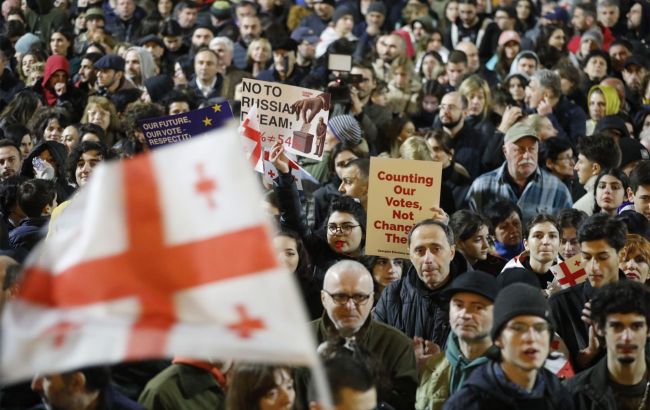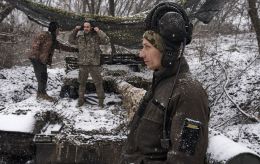From criticism to revision of relations: How West reacts to Georgia elections results
 Illustrative image (Getty Images)
Illustrative image (Getty Images)
Western leaders have expressed concern over serious violations in Georgia's parliamentary elections and called for investigations, and some have threatened consequences. In particular, Canada announced a review and Sweden announced the termination of relations with the Georgian authorities.
RBC-Ukraine has gathered more information about how the West is reacting to the elections in Georgia in this article.
Parliamentary elections in Georgia: What government and opposition say
Parliamentary elections in Georgia took place on October 26, 2024. The competition was between the Georgian Dream party, which has been in power for 12 years, and pro-European opposition political forces.
According to the country's CEC, the ruling Georgian Dream party, which is also called pro-Russian, won more than 54% of the vote in the election, overtaking the opposition parties. This allows it to once again form the Georgian government single-handedly.
Instead, the opposition and Georgian President Salome Zurabishvili announced that they would not recognize the results of the elections in the country. They claimed that the results were falsified under the influence of Russia and called on the country's residents to come out to protest.
On October 26, violations were indeed recorded at Georgian polling stations. In particular, there were cases of ballot stuffing and clashes near polling stations. In addition, international observers claim significant violations in the elections in Georgia.
The EU is demanding an investigation into the election violations in Georgia. In return, Georgian Prime Minister Irakli Kobakhidze said that the government would be approved despite the position of the opposition forces.
In turn, those dissatisfied with the election results came out to protest on Monday, October 29. During a large protest in Tbilisi, the Georgian opposition voiced demands, including repeat elections.
These elections are critically important for Georgia, as they determine the country's future course - towards the EU or closer ties with Russia.
Voters were allowed to choose between a pro-Western opposition alliance and the pro-Russian ruling Georgian Dream party. The latter, despite numerous reports of electoral violations, claims that the election results will be validated.
At the same time, Kobakhidze himself denies the existence of parties in Georgia that would be under Russian influence. Moreover, he stated that the government's priority is allegedly European integration. According to him, the Georgian government wants to fulfill more than 90% of its obligations under the Association and Free Trade Agreement.
The Prime Minister stated that Georgia would achieve its ultimate goal of full integration into the EU by 2030, emphasizing the importance of development in all areas to reach this objective, and assured that every effort would be made to accomplish it.
The Orbán scandal
Hungarian Prime Minister Viktor Orbán, known for his ties to the Kremlin, was one of the first to congratulate the Georgian authorities on their so-called victory in the election, without waiting for the official results.
He arrived in Tbilisi on the evening of October 28 to meet with the Georgian Prime Minister. On the way to the hotel, Orbán's motorcade was booed by protesters against the results of the parliamentary elections.
Orbán had already held a joint briefing with Kobakhidze, during which he said that the Georgian people made the right decision in the parliamentary elections. He made a cynical statement, mentioning Ukraine
“I would like to congratulate you on the fact that, in the context of the desire for European integration, you have not allowed your country to be turned into a second Ukraine,” Orbán said.
His stunt has already been criticized by 13 EU ministers. In a joint statement, they noted that Prime Minister Orbán's premature visit to Georgia, whose country holds the temporary presidency of the EU Council, does not speak for the European Union.
How West reacts to election results in Georgia
OSCE
International observers have already expressed concern over numerous violations in the parliamentary elections in Georgia. According to the head of the OSCE mission, Pascal Allizard, they took place in a tense atmosphere, and facts of violation of the secrecy of the vote were revealed.
Experts recorded cases of voter intimidation, pressure on civil servants, violence against observers, vote buying, multiple voting, and ballot stuffing. Representatives of the mission demanded an investigation into the election violations and called for further democratic reforms in Georgia.
NATO
NATO spokesperson Farah Dakhlallah called for an investigation into the problems in Georgia's parliamentary elections, which were pointed out by international observers. According to her, it is an unequal playing field between political parties in the elections, which undermines public confidence in the outcome.
She said that reports of election-related violations needed to be fully investigated.
European Commission
European Commission spokesperson Nabila Massrali said that the EU expects the Central Election Commission and other relevant authorities to investigate the problems identified by observers.
She added that, in line with the European Council's conclusions of October 17, Georgia was being urged to adopt democratic, comprehensive, and consistent reforms aligned with the cornerstone principles of European integration.
In turn, the head of the European Commission, Ursula von der Leyen, said that the Georgian people have the right to know what happened during the parliamentary elections.
USA
US State Department spokesperson Matthew Miller called on the Georgian authorities to consider what kind of relationship they want with the Euro-Atlantic community, rather than reinforcing policies that are praised by authoritarians.
Miller warned that throughout the year, they had consistently urged the Georgian government to abandon anti-democratic actions and return to the Euro-Atlantic path, adding that further consequences were not ruled out if the government’s course of action remained unchanged
Lithuania
Lithuanian President Gitanas Nausėda questioned whether the Georgian Dream won the most support during Saturday's vote.
Nauseda stated that within Georgia, only one person—Bidzina Ivanishvili, the de facto leader of the Georgian Dream and an oligarch with ties to Russia—would be pleased with this outcome. He added that only forces outside Georgia could be happy about it, as these election results were absolutely incompatible with closer alignment with the European Union.
France
According to French Foreign Minister Jean-Noël Barrot, the preliminary findings of the OSCE mission confirm concerns about the developments in Georgia.
He stated France expected the authorities to investigate the allegations of violations, emphasizing that fundamental freedoms and political pluralism needed to be respected for Georgia to progress toward EU membership
Canada
Ottawa also expressed concern and announced its intention to review relations with the Georgian authorities. Canada called on all parties to show restraint and on the Georgian authorities to respect the right of citizens to peaceful protest.
The Canadian Foreign Affairs Ministry stated that Canada remained open to working with Georgia, provided that the Georgian leadership respected democracy, human rights, and the rule of law, and addressed the recent democratic backsliding.
Sweden
The Swedish government announced the suspension of all direct cooperation at the level of government agencies with Georgia. At the same time, the country allocates 25 million kronor to support civil society in the country.
Swedish Minister for Development Cooperation and Foreign Trade, Benjamin Dawes, expressed that the situation in Georgia had been a serious concern for some time, and the irregularities reported by international observers in the recent parliamentary elections only intensified this concern.
He added that cooperation could be resumed in the future if Georgia moves closer to the EU again.
Read more about the importance of the elections in Georgia and whether the mass protests after them will be successful in an RBC-Ukraine article.
Sources: Echo of the Caucasus, Channel One, News Georgia, Sova, and Dagens Nyheter, as well as statements by country leaders and government representatives, as well as representatives of the EU and NATO.

